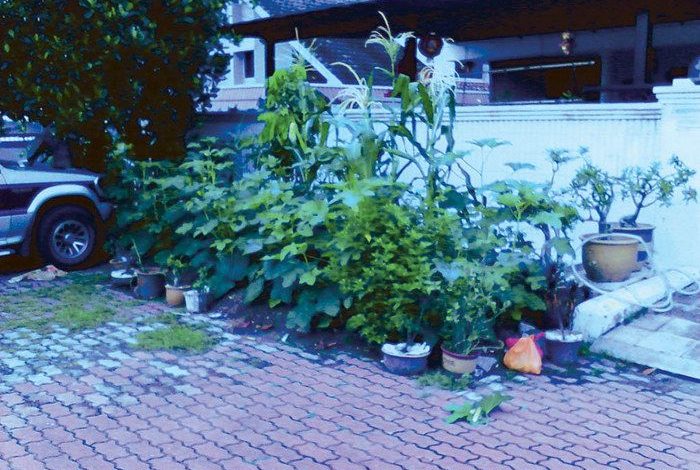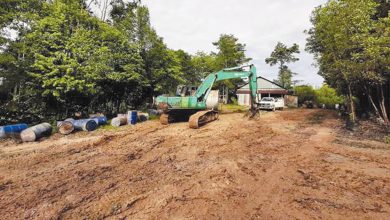Let the plants do the talking


By Mariam Mokhtar
You are a keen gardener but the soil in your garden is of poor quality. Fertiliser cannot work wonders and you can’t afford to keep buying what the garden centre markets as “special soil”.
Perhaps you are someone who consumes only organic fruits and vegetables, but find the cost of organic crops prohibitive. You would much rather grow your own, and enjoy the benefits of harvesting your own produce, but you don’t know how.




The solution to these three problems is good compost. Recycling your household kitchen waste and converting it into good quality compost, free of preservative and harmful chemicals, is easy. The process does not take much effort, just a little patience. The hard work is done by the sun, earthworms and Black Soldier Flies (BSF). The finished product is known as vermi-compost, in acknowledgement of the worms which produce it.
Retired construction businessman PY Wong has started what he calls, ‘Projek Cinta’, in his community. When Ipoh Echo caught up with Wong, he said that there was no reason why the same results could not be replicated in Ipoh.
Wong said that Projek Cinta is all about love for our fellow Malaysians. He said, “Sustainable living is important and it is about going back to basics, with respect to agriculture, and living in harmony with the land, nature and our community.”
The motivation for this project was propelled by Wong’s passion for social justice and a determination to help secure the future of younger generations. He believes that rural poverty should be addressed through sustainable economic activities, which will benefit the farmers directly, instead of monetary grants.
In addition to the multiple benefits to the local community and environment, Projek Cinta is also about food security. Wong said, “Recycling our food and organic waste means that the council can reduce the load on our waste dump by over 50%. There will be reduced contamination of our ground water, whilst the vermi-compost that is produced, will promote chemical-free food.
“Rural communities could increase their incomes, and connect directly with the consumers, who will have access to a guaranteed supply of more healthy food at lower prices. This can be helpful to fight food inflation and promote food security.”
Wong received some tips from the Centre for Environment, Technology & Development, Malaysia (CETDEM), and has some useful advice for people who are keen to start recycling. He said, “People could dump their food-waste into old tyres, then cover it with a vermin-proof, heavy lid that could not be moved by dogs. If the cover is cut to fit the recess in the tyre, there is no way any rat could lift it up.”
Most homes have a corner in the garden, where a tyre could be placed and Wong claims that if the waste food is covered with a damp cloth, the smell is not noticeable. He said, “In Malaysia, the rotting food attracts Black Soldier Flies (BSF) which digests the food very quickly. BSF is considered a friendly fly, non-pathogenic because it has no eating parts, only a proboscis for drinking. The leachate will enter the soil and provide natural fertiliser for the plants.”
Projek Cinta is still evolving, said Wong, “We have been through many trials and errors but we are working towards developing a low-cost system that anyone can set-up, at minimal cost. Once we get it working, we duplicate it.”
Two years ago, Wong started off in SS17 in Subang Jaya, by working with the Rukun Tetangga. He said, “Now we are working to persuade our neighbours to agree on our Zero-Foodwaste Programme. This means that no food waste will leave SS 17. Everything will be recycled. On our road, we have 80% acceptance from those we have approached.”
To show the success of recycling food-waste, he grew fruits and vegetables in the vermi-compost. He said, “The healthy okra and corn in the garden, which we created in front of our house, were a convincing argument. People were very impressed in the results.
When passers-by approach him to chat about his plants, he uses the opportunity to sell them the idea of going back to basics, and planting their own food, to maximise land-usage and convert food waste into compost.
He is keen to promote the need for food security, and the supply of food at prices lower than the supermarkets. In addition, the food is fresher and chemical-free, because it is grown with vermi-compost. He suggests growing one’s own food, to offset the increasing cost of living.
Wong claims that Projek Cinta has changed his life. “Going back to agriculture and nature is what many people would like to do, given the opportunity. I feel blessed to be able to afford the time to do this.
“We let the plants do the talking and residents are attracted to the large and fast-growing plants. We hope to get more people on board our programme.”


